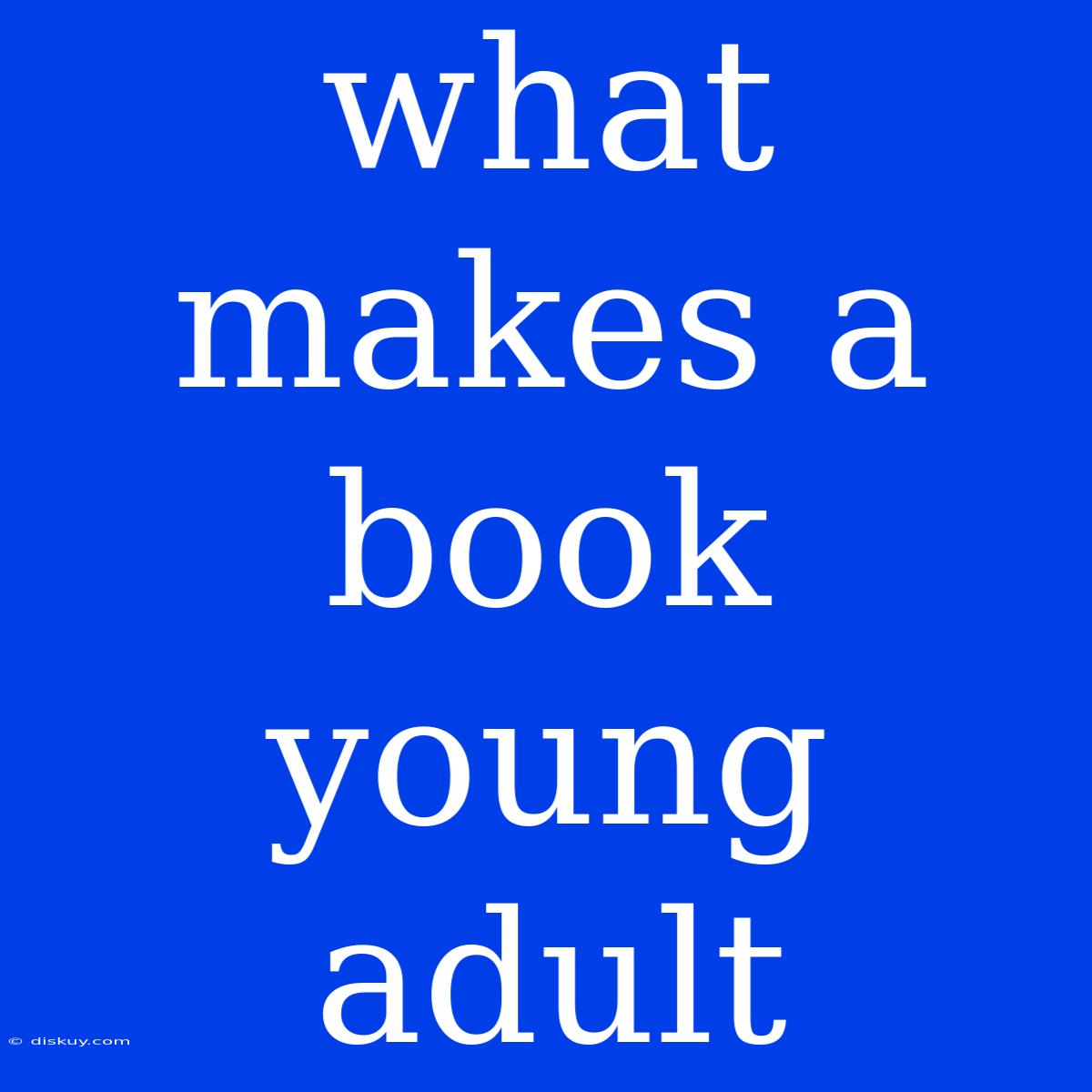What Makes a Book Young Adult? Unlocking the Secrets of YA Literature
What is young adult fiction, and what makes it so captivating? Young adult (YA) literature is a genre that often sparks intense passion and heated debate. It's a genre that's not just about teenage characters; it's about navigating the complexities of growing up.
Editor Note: This exploration of young adult literature aims to shed light on the defining characteristics that make this genre so popular and relatable to readers of all ages.
Why Should You Care? YA fiction isn't just for teenagers; it offers a unique window into the universal experiences of adolescence, making it a compelling read for any age group. This article dives deep into the key elements that define YA fiction, providing insight into its popularity and its impact on contemporary literature.
Analysis: To understand what makes a book "young adult," we analyzed numerous bestsellers, critically acclaimed novels, and contemporary YA titles. We scrutinized plot structures, character arcs, themes, and writing styles to pinpoint the essential elements that distinguish this genre.
Key Aspects of Young Adult Literature
| Aspect | Description |
|---|---|
| Target Audience | Primarily geared towards readers aged 12-18, but appeals to broader audiences. |
| Themes | Explores universal themes of identity, relationships, self-discovery, belonging, and coming-of-age. |
| Characters | Typically features protagonists who are teenagers or young adults, facing relatable challenges. |
| Plot | Often focuses on high stakes and dramatic situations, with compelling twists and turns. |
| Writing Style | Often written in a concise and engaging style, using relatable language and contemporary settings. |
Young Adult Literature: A Deeper Dive
Target Audience
Young adult literature primarily targets readers between 12 and 18 years old, but its engaging narratives and relatable characters resonate with readers of all ages.
Facets:
- Age Range: While the primary target audience is teenagers, YA fiction often appeals to adults who enjoy revisiting the complexities of adolescence or seeking a relatable escape.
- Genre Appeal: YA novels span various genres, from fantasy and science fiction to contemporary romance and historical fiction, catering to diverse reader preferences.
- Themes of Relevance: The exploration of universal themes such as identity, relationships, and self-discovery resonates across generations, making YA fiction accessible and relevant to readers of all ages.
Themes
YA fiction delves into the universal experiences of adolescence, exploring themes that resonate deeply with young readers.
Facets:
- Identity Formation: YA protagonists often grapple with self-discovery, navigating societal expectations and discovering their unique place in the world.
- Relationships: YA novels explore the complexities of friendship, family, romantic relationships, and the challenges of navigating these bonds during adolescence.
- Coming-of-Age: Central to YA literature is the exploration of growing up, facing challenges, making mistakes, and learning from experiences.
- Social Issues: Contemporary YA fiction often addresses social issues such as bullying, racism, LGBTQ+ rights, and mental health, encouraging empathy and understanding.
Characters
YA fiction typically features relatable and complex characters who grapple with the challenges of growing up.
Facets:
- Teen Protagonists: The protagonists are usually teenagers facing relatable problems and making decisions that shape their futures.
- Character Arcs: YA novels often showcase significant character development, emphasizing the growth and transformation of the protagonists as they overcome obstacles.
- Complex Relationships: YA characters navigate complex relationships with family, friends, and potential romantic partners, showcasing the intricacies of human connection.
Plot
YA novels typically feature high stakes, dramatic situations, and compelling storylines.
Facets:
- Fast-Paced Action: YA fiction often features action-packed plots, keeping readers engaged and invested in the protagonist's journey.
- Cliffhangers and Twists: YA novels often utilize cliffhangers and unexpected twists to maintain suspense and keep readers guessing.
- Emotional Depth: Beneath the thrilling action, YA plots often explore emotional depths, allowing readers to connect with the protagonist's struggles and triumphs.
Writing Style
YA fiction typically employs a concise and engaging writing style, using relatable language and contemporary settings.
Facets:
- Accessible Language: YA novels use language that is easily understood by young readers while still maintaining a sophisticated tone.
- Contemporary Settings: YA fiction often takes place in modern settings, allowing readers to connect with the familiar and relatable environments.
- First-Person Narrative: YA novels often use first-person narration, allowing readers to directly access the thoughts and feelings of the protagonist.
FAQ
Q: Can adults enjoy young adult fiction? A: Absolutely! YA fiction offers relatable characters, engaging plots, and thought-provoking themes that appeal to readers of all ages.
Q: What makes a book "too mature" for young adults? A: Books that contain explicit sexual content, graphic violence, or sensitive topics that may be inappropriate for young readers are typically considered too mature for the YA audience.
Q: Are all YA novels the same? A: Not at all! YA fiction encompasses various genres and themes, offering diverse and engaging reading experiences.
Q: How can I find a good young adult book? A: Explore online reviews, book recommendations from friends, or visit your local bookstore to discover hidden gems in the YA genre.
Tips for Exploring Young Adult Literature
- Start with a genre you enjoy: Dive into YA fantasy, romance, or science fiction, depending on your reading preferences.
- Read reviews and recommendations: Explore online reviews and recommendations from trusted sources to discover captivating YA titles.
- Visit your local bookstore: Engage with a librarian or bookstore staff for personalized recommendations and explore the diverse world of YA fiction.
- Don't be afraid to experiment: Try different authors and genres within the YA spectrum to discover hidden gems and broaden your reading horizons.
Summary:
Young adult fiction is a vibrant and engaging genre that offers relatable characters, captivating plots, and a unique perspective on the universal experiences of growing up.
Closing Message: The next time you are looking for a captivating read, consider exploring the world of YA fiction. It offers a gateway to discovering compelling stories, relatable characters, and enduring themes that resonate across generations.

